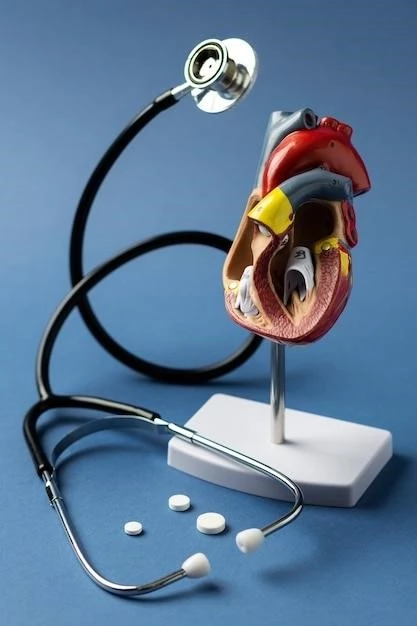Dilated Cardiomyopathy
Understanding Dilated Cardiomyopathy ー a condition where the heart’s ability to pump blood is weakened due to an enlarged heart and heart failure․ Learn about genetic mutations affecting the cardiac muscle․
Understanding Dilated Cardiomyopathy
Dilated Cardiomyopathy is a condition where the heart muscle becomes weakened and enlarged, leading to heart failure․ Genetic mutations can also play a role in its development, impacting the cardiac muscle function․ Symptoms may include fatigue, shortness of breath, swelling, and irregular heartbeat․
- Genetic Mutations⁚ Certain genes can predispose individuals to dilated cardiomyopathy․
- Cardiac Muscle⁚ The heart muscle weakens over time, affecting its ability to pump blood efficiently․
- Symptoms⁚ Recognizing symptoms such as fatigue, swelling in legs, and chest pain is crucial for early diagnosis․
- Diagnosis⁚ Medical history, physical examination, tests like echocardiogram, MRI scan, and blood tests are used to diagnose the condition and assess heart function․
Understanding the basics of dilated cardiomyopathy is essential in managing the condition effectively․ Stay informed about genetic factors, cardiac muscle health, common symptoms, and diagnostic procedures to take control of your heart health․
Symptoms and Diagnosis
Recognizing symptoms of dilated cardiomyopathy is vital for timely diagnosis and management․ Symptoms can include fatigue, weakness, shortness of breath, swelling in the legs, irregular heartbeat, and dizziness․ If you experience these, consult a healthcare provider promptly․
Diagnosing dilated cardiomyopathy involves a series of tests, including a thorough medical history review, physical examination, echocardiogram to visualize the heart’s size and function, MRI scans for detailed images, and blood tests to assess heart health markers․ These diagnostic tools help healthcare professionals understand the extent of heart damage and identify the most appropriate treatment plan․
Early detection through symptom recognition and diagnostic tests is crucial for improving outcomes and quality of life for individuals with dilated cardiomyopathy․ Regular monitoring and timely intervention based on accurate diagnosis play a significant role in managing the condition effectively․
Treatment Options
Managing dilated cardiomyopathy involves a comprehensive approach tailored to each individual’s needs․ Treatment options may include medications to improve heart function and manage symptoms, such as ACE inhibitors, beta-blockers, and diuretics․ In some cases, blood thinners may be prescribed to reduce the risk of blood clots․
Lifestyle changes play a crucial role in managing dilated cardiomyopathy․ Adopting a heart-healthy diet low in sodium and saturated fats, engaging in regular exercise within recommended limits, managing stress effectively, and avoiding tobacco and excessive alcohol are essential for overall heart health․
In more severe cases, advanced treatment options like implantable devices such as pacemakers or defibrillators may be necessary to regulate heart rhythm․ For individuals with end-stage heart failure, a heart transplant may be considered as a last resort option․
Collaboration with a team of healthcare providers, including cardiologists, dietitians, and therapists, is crucial in developing a personalized treatment plan․ Adhering to prescribed medications, making lifestyle changes, and attending regular follow-up appointments are key to managing dilated cardiomyopathy effectively and improving quality of life․
Prognosis and Complications
The prognosis for individuals with dilated cardiomyopathy varies based on the severity of the condition, response to treatment, and overall health․ Adhering to prescribed medications, lifestyle modifications, and regular medical follow-ups can positively impact outcomes․
Complications of dilated cardiomyopathy may include arrhythmias, blood clots leading to stroke, heart valve problems, and heart failure exacerbation․ Recognizing complications early and seeking prompt medical attention can help prevent further heart damage and improve prognosis․
Understanding the potential challenges and monitoring for complications are essential components of managing dilated cardiomyopathy effectively․ By staying proactive, following treatment plans, and maintaining open communication with healthcare providers, individuals can better navigate the prognosis and reduce the risk of complications associated with the condition․
Heart-Healthy Lifestyle Changes

Adopting heart-healthy lifestyle changes is crucial for managing dilated cardiomyopathy․ Focus on a well-balanced diet rich in fruits, vegetables, whole grains, lean proteins, and low-fat dairy while limiting salt, sugar, and saturated fats․ Maintaining a healthy weight and proper hydration are also essential․
Regular exercise, as recommended by healthcare providers, can improve heart function, reduce strain on the heart, and enhance overall well-being․ Engage in physical activities such as walking, cycling, swimming, or yoga to promote cardiovascular health․
Effective stress management techniques, such as mindfulness meditation, deep breathing exercises, or engaging in hobbies, can help lower stress levels and promote emotional well-being․ Adequate sleep, avoiding smoking, and limiting alcohol intake are additional lifestyle modifications that can benefit heart health․
By prioritizing heart-healthy lifestyle changes, individuals with dilated cardiomyopathy can support their heart function, improve quality of life, and reduce the risk of complications․ Consistent adherence to these recommendations, along with ongoing communication with healthcare providers, is key to managing the condition effectively․
Medical Management
Medical management of dilated cardiomyopathy involves a multidisciplinary approach aimed at optimizing heart function and managing symptoms․ Healthcare providers may prescribe medications such as ACE inhibitors, beta-blockers, or diuretics to improve heart performance and reduce strain․
Regular monitoring of heart function through tests like echocardiograms and MRIs helps track changes in the heart’s structure and function over time․ Adjustments to medication dosages or treatment plans may be recommended based on these assessments․
In cases where conventional medications are insufficient, advanced therapies like implantable devices such as pacemakers or defibrillators may be considered․ These devices can help regulate heart rhythm and prevent sudden cardiac arrest in some individuals․
For individuals with severe heart failure not responsive to other treatments, a heart transplant might be necessary․ This option is typically reserved for those who have exhausted all other treatment avenues and can benefit from a new heart to improve quality of life and overall prognosis․
Effective medical management, with close collaboration between healthcare providers and individuals with dilated cardiomyopathy, plays a vital role in optimizing heart function, managing symptoms, and improving outcomes․ Adherence to prescribed treatments and regular follow-ups are essential components of successful medical management of the condition․
Prevention Strategies
While some risk factors for dilated cardiomyopathy, such as genetic mutations, cannot be modified, adopting preventive measures is crucial in reducing the likelihood of developing the condition․ Maintaining a heart-healthy lifestyle, including a balanced diet, regular exercise, and stress management, can promote overall cardiovascular health․
Avoiding tobacco and excessive alcohol consumption, managing underlying conditions like high blood pressure or diabetes, and attending regular medical check-ups for early detection of heart issues are essential preventive strategies․ Understanding family history and discussing potential genetic risks with healthcare providers can also help in proactive management․
Educating oneself about the signs and symptoms of heart problems, such as chest pain, shortness of breath, and fatigue, and seeking medical attention promptly when experiencing these warning signs can aid in early intervention and prevention of complications associated with dilated cardiomyopathy․
Proactive efforts in adopting preventive lifestyles, monitoring risk factors, and staying vigilant about heart health can significantly contribute to reducing the incidence and impact of dilated cardiomyopathy․ By prioritizing preventive strategies, individuals can take control of their cardiovascular well-being and potentially lower their risk of developing heart-related conditions․
Impact of Medical History
Understanding the impact of your medical history on dilated cardiomyopathy can provide valuable insights into the potential causes and risk factors for the condition․ Factors such as family history of heart disease, previous heart attacks, high blood pressure, diabetes, or viral infections can contribute to the development of dilated cardiomyopathy․
Discussing your medical history with healthcare providers is essential in tailoring an appropriate treatment plan and preventive strategies․ Past surgeries, medication use, lifestyle habits, and other health conditions can influence the management and prognosis of dilated cardiomyopathy․
Regularly updating your healthcare team about any changes in your medical history, including new diagnoses or procedures, can help guide decisions regarding medications, interventions, and lifestyle modifications․ By providing a comprehensive medical history, you enable healthcare providers to deliver personalized care focused on optimizing heart health and managing dilated cardiomyopathy effectively․
Surgical Interventions
For individuals with severe dilated cardiomyopathy or complications that do not respond to medical management, surgical interventions may be necessary․ Some surgical options include ventricular assist devices (VADs) to aid heart function, implantation of pacemakers or defibrillators for arrhythmia control, or cardiac resynchronization therapy (CRT) to improve heart rhythm․
In cases of end-stage heart failure where other treatments have been ineffective, a heart transplant may be considered․ This complex surgery involves replacing a failing heart with a healthy donor heart to restore proper function and improve quality of life․
Prior to undergoing surgical interventions, individuals will undergo thorough evaluations to assess their overall health, potential benefits of the procedure, and risks involved․ Understanding the rationale behind surgical interventions, discussing expectations with healthcare providers, and following post-operative care instructions are crucial steps in achieving successful outcomes․
Surgical interventions for dilated cardiomyopathy require careful consideration of individual needs and close collaboration between patients, caregivers, and healthcare teams․ By exploring surgical options when appropriate and fully engaging in the treatment process, individuals can work towards better heart function and enhanced quality of life․
Future Research and Advancements
Ongoing research into dilated cardiomyopathy aims to advance treatment options, improve outcomes, and enhance understanding of the condition․ Scientists are exploring genetic therapies, stem cell treatments, and precision medicine approaches to develop targeted interventions for individuals with dilated cardiomyopathy․
Advancements in imaging technologies and diagnostic tools continue to enhance early detection and monitoring of heart function changes in dilated cardiomyopathy․ Researchers are also investigating novel drug therapies, personalized treatment strategies, and innovative surgical techniques to address the complexities of the condition more effectively․
Clinical trials play a vital role in evaluating the safety and efficacy of new treatments for dilated cardiomyopathy․ Participation in research studies offers individuals the opportunity to contribute to medical advancements, access cutting-edge therapies, and potentially benefit from novel approaches that could transform the management of the condition in the future․
By staying informed about the latest research findings, engaging with healthcare providers, and considering participation in clinical trials, individuals with dilated cardiomyopathy can proactively contribute to shaping the future of treatment options and advancements in the field․ Embracing innovative approaches and supporting research efforts can pave the way for improved outcomes and quality of life for those affected by dilated cardiomyopathy․
